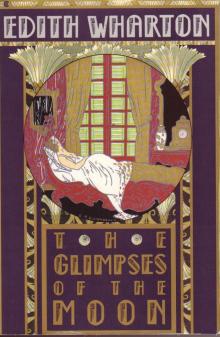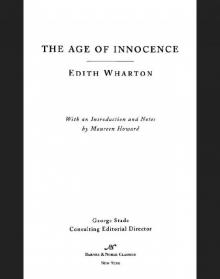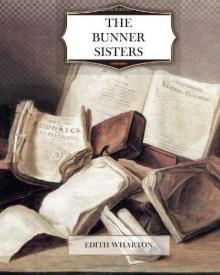- Home
- Edith Wharton
The Touchstone Page 6
The Touchstone Read online
Page 6
Providence the very next day hastened to justify this measure by placing on Glennard’s breakfast-plate an envelope bearing the name of the publishers to whom he had sold Mrs. Aubyn’s letters. It happened to be the only letter the early post had brought, and he glanced across the table at his wife, who had come down before him and had probably laid the envelope on his plate. She was not the woman to ask awkward questions, but he felt the conjecture of her glance, and he was debating whether to affect surprise at the receipt of the letter, or to pass it off as a business communication that had strayed to his house, when a check fell from the envelope. It was the royalty on the first edition of the letters. His first feeling was one of simple satisfaction. The money had come with such infernal opportuneness that he could not help welcoming it. Before long, too, there would be more; he knew the book was still selling far beyond the publisher’s previsions. He put the check in his pocket and left the room without looking at his wife.
On the way to his office the habitual reaction set in. The money he had received was the first tangible reminder that he was living on the sale of his self-esteem. The thought of material benefit had been overshadowed by his sense of the intrinsic baseness of making the letters known; now he saw what an element of sordidness it added to the situation and how the fact that he needed the money, and must use it, pledged him more irrevocably than ever to the consequences of his act. It seemed to him, in that first hour of misery, that he had betrayed his friend anew.
When, that afternoon, he reached home earlier than usual, Alexa’s drawing-room was full of a gayety that overflowed to the stairs. Flamel, for a wonder, was not there; but Dresham and young Hartly, grouped about the tea-table, were receiving with resonant mirth a narrative delivered in the fluttered staccato that made Mrs. Armiger’s conversation like the ejaculations of a startled aviary.
She paused as Glennard entered, and he had time to notice that his wife, who was busied about the tea-tray, had not joined in the laughter of the men.
“Oh, go on, go on,” young Hartly rapturously groaned; and Mrs. Armiger met Glennard’s inquiry with the deprecating cry that really she didn’t see what there was to laugh at. “I’m sure I feel more like crying. I don’t know what I should have done if Alexa hadn’t been home to give me a cup of tea. My nerves are in shreds—yes, another, dear, please—” and as Glennard looked his perplexity, she went on, after pondering on the selection of a second lump of sugar, “Why, I’ve just come from the reading, you know—the reading at the Waldorf.”
“I haven’t been in town long enough to know anything,” said Glennard, taking the cup his wife handed him. “Who has been reading what?”
“That lovely girl from the South—Georgie—Georgie what’s her name—Mrs. Dresham’s protegee—unless she’s YOURS, Mr. Dresham! Why, the big ball-room was PACKED, and all the women were crying like idiots—it was the most harrowing thing I ever heard—”
“What DID you hear?” Glennard asked; and his wife interposed: “Won’t you have another bit of cake, Julia? Or, Stephen, ring for some hot toast, please.” Her tone betrayed a polite satiety of the topic under discussion. Glennard turned to the bell, but Mrs. Armiger pursued him with her lovely amazement.
“Why, the ‘Aubyn Letters’—didn’t you know about it? The girl read them so beautifully that it was quite horrible—I should have fainted if there’d been a man near enough to carry me out.”
Hartly’s glee redoubled, and Dresham said, jovially, “How like you women to raise a shriek over the book and then do all you can to encourage the blatant publicity of the readings!”
Mrs. Armiger met him more than half-way on a torrent of self-accusal. “It WAS horrid; it was disgraceful. I told your wife we ought all to be ashamed of ourselves for going, and I think Alexa was quite right to refuse to take any tickets—even if it was for a charity.”
“Oh,” her hostess murmured, indifferently, “with me charity begins at home. I can’t afford emotional luxuries.”
“A charity? A charity?” Hartly exulted. “I hadn’t seized the full beauty of it. Reading poor Margaret Aubyn’s love-letters at the Waldorf before five hundred people for a charity! WHAT charity, dear Mrs. Armiger?”
“Why, the Home for Friendless Women—”
“It was well chosen,” Dresham commented; and Hartly buried his mirth in the sofa-cushions.
When they were alone Glennard, still holding his untouched cup of tea, turned to his wife, who sat silently behind the kettle. “Who asked you to take a ticket for that reading?”
“I don’t know, really—Kate Dresham, I fancy. It was she who got it up.”
“It’s just the sort of damnable vulgarity she’s capable of! It’s loathsome—it’s monstrous—”
His wife, without looking up, answered gravely, “I thought so too. It was for that reason I didn’t go. But you must remember that very few people feel about Mrs. Aubyn as you do—”
Glennard managed to set down his cup with a steady hand, but the room swung round with him and he dropped into the nearest chair. “As I do?” he repeated.
“I mean that very few people knew her when she lived in New York. To most of the women who went to the reading she was a mere name, too remote to have any personality. With me, of course, it was different—”
Glennard gave her a startled look. “Different? Why different?”
“Since you were her friend—”
“Her friend!” He stood up impatiently. “You speak as if she had had only one—the most famous woman of her day!” He moved vaguely about the room, bending down to look at some books on the table. “I hope,” he added, “you didn’t give that as a reason, by the way?”
“A reason?”
“For not going. A woman who gives reasons for getting out of social obligations is sure to make herself unpopular or ridiculous.
The words were uncalculated; but in an instant he saw that they had strangely bridged the distance between his wife and himself. He felt her close on him, like a panting foe; and her answer was a flash that showed the hand on the trigger.
“I seem,” she said from the threshold, “to have done both in giving my reason to you.”
The fact that they were dining out that evening made it easy for him to avoid Alexa till she came downstairs in her opera-cloak. Mrs. Touchett, who was going to the same dinner, had offered to call for her, and Glennard, refusing a precarious seat between the ladies’ draperies, followed on foot. The evening was interminable. The reading at the Waldorf, at which all the women had been present, had revived the discussion of the “Aubyn Letters” and Glennard, hearing his wife questioned as to her absence, felt himself miserably wishing that she had gone, rather than that her staying away should have been remarked. He was rapidly losing all sense of proportion where the “Letters” were concerned. He could no longer hear them mentioned without suspecting a purpose in the allusion; he even yielded himself for a moment to the extravagance of imagining that Mrs. Dresham, whom he disliked, had organized the reading in the hope of making him betray himself—for he was already sure that Dresham had divined his share in the transaction.
The attempt to keep a smooth surface on this inner tumult was as endless and unavailing as efforts made in a nightmare. He lost all sense of what he was saying to his neighbors and once when he looked up his wife’s glance struck him cold.
She sat nearly opposite him, at Flamel’s side, and it appeared to Glennard that they had built about themselves one of those airy barriers of talk behind which two people can say what they please. While the reading was discussed they were silent. Their silence seemed to Glennard almost cynical—it stripped the last disguise from their complicity. A throb of anger rose in him, but suddenly it fell, and he felt, with a curious sense of relief, that at bottom he no longer cared whether Flamel had told his wife or not. The assumption that Flamel knew about the letters had become a fact to Glennard; and it now seemed to him better that Alexa should know too.
He was frightened at firs
t by the discovery of his own indifference. The last barriers of his will seemed to be breaking down before a flood of moral lassitude. How could he continue to play his part, to keep his front to the enemy, with this poison of indifference stealing through his veins? He tried to brace himself with the remembrance of his wife’s scorn. He had not forgotten the note on which their conversation had closed. If he had ever wondered how she would receive the truth he wondered no longer—she would despise him. But this lent a new insidiousness to his temptation, since her contempt would be a refuge from his own. He said to himself that, since he no longer cared for the consequences, he could at least acquit himself of speaking in self-defence. What he wanted now was not immunity but castigation: his wife’s indignation might still reconcile him to himself. Therein lay his one hope of regeneration; her scorn was the moral antiseptic that he needed, her comprehension the one balm that could heal him….
When they left the dinner he was so afraid of speaking that he let her drive home alone, and went to the club with Flamel.
IX
HE rose next morning with the resolve to know what Alexa thought of him. It was not anchoring in a haven, but lying to in a storm—he felt the need of a temporary lull in the turmoil of his sensations.
He came home late, for they were dining alone and he knew that they would have the evening together. When he followed her to the drawing-room after dinner he thought himself on the point of speaking; but as she handed him his coffee he said, involuntarily: “I shall have to carry this off to the study, I’ve got a lot of work to-night.”
Alone in the study he cursed his cowardice. What was it that had withheld him? A certain bright unapproachableness seemed to keep him at arm’s length. She was not the kind of woman whose compassion could be circumvented; there was no chance of slipping past the outposts; he would never take her by surprise. Well—why not face her, then? What he shrank from could be no worse than what he was enduring. He had pushed back his chair and turned to go upstairs when a new expedient presented itself. What if, instead of telling her, he were to let her find out for herself and watch the effect of the discovery before speaking? In this way he made over to chance the burden of the revelation.
The idea had been suggested by the sight of the formula enclosing the publisher’s check. He had deposited the money, but the notice accompanying it dropped from his note-case as he cleared his table for work. It was the formula usual in such cases and revealed clearly enough that he was the recipient of a royalty on Margaret Aubyn’s letters. It would be impossible for Alexa to read it without understanding at once that the letters had been written to him and that he had sold them….
He sat downstairs till he heard her ring for the parlor-maid to put out the lights; then he went up to the drawing-room with a bundle of papers in his hand. Alexa was just rising from her seat and the lamplight fell on the deep roll of hair that overhung her brow like the eaves of a temple. Her face had often the high secluded look of a shrine; and it was this touch of awe in her beauty that now made him feel himself on the brink of sacrilege.
Lest the feeling should dominate him, he spoke at once. “I’ve brought you a piece of work—a lot of old bills and things that I want you to sort for me. Some are not worth keeping—but you’ll be able to judge of that. There may be a letter or two among them—nothing of much account, but I don’t like to throw away the whole lot without having them looked over and I haven’t time to do it myself.”
He held out the papers and she took them with a smile that seemed to recognize in the service he asked the tacit intention of making amends for the incident of the previous day.
“Are you sure I shall know which to keep?”
“Oh, quite sure,” he answered, easily—“and besides, none are of much importance.”
The next morning he invented an excuse for leaving the house without seeing her, and when he returned, just before dinner, he found a visitor’s hat and stick in the hall. The visitor was Flamel, who was in the act of taking leave.
He had risen, but Alexa remained seated; and their attitude gave the impression of a colloquy that had prolonged itself beyond the limits of speech. Both turned a surprised eye on Glennard and he had the sense of walking into a room grown suddenly empty, as though their thoughts were conspirators dispersed by his approach. He felt the clutch of his old fear. What if his wife had already sorted the papers and had told Flamel of her discovery? Well, it was no news to Flamel that Glennard was in receipt of a royalty on the “Aubyn Letters.”…
A sudden resolve to know the worst made him lift his eyes to his wife as the door closed on Flamel. But Alexa had risen also, and bending over her writing-table, with her back to Glennard, was beginning to speak precipitately.
“I’m dining out to-night—you don’t mind my deserting you? Julia Armiger sent me word just now that she had an extra ticket for the last Ambrose concert. She told me to say how sorry she was that she hadn’t two—but I knew YOU wouldn’t be sorry!” She ended with a laugh that had the effect of being a strayed echo of Mrs. Armiger’s; and before Glennard could speak she had added, with her hand on the door, “Mr. Flamel stayed so late that I’ve hardly time to dress. The concert begins ridiculously early, and Julia dines at half-past seven—”
Glennard stood alone in the empty room that seemed somehow full of an ironical consciousness of what was happening. “She hates me,” he murmured. “She hates me….”
The next day was Sunday, and Glennard purposely lingered late in his room. When he came downstairs his wife was already seated at the breakfast-table. She lifted her usual smile to his entrance and they took shelter in the nearest topic, like wayfarers overtaken by a storm. While he listened to her account of the concert he began to think that, after all, she had not yet sorted the papers, and that her agitation of the previous day must be ascribed to another cause, in which perhaps he had but an indirect concern. He wondered it had never before occurred to him that Flamel was the kind of man who might very well please a woman at his own expense, without need of fortuitous assistance. If this possibility cleared the outlook it did not brighten it. Glennard merely felt himself left alone with his baseness.
Alexa left the breakfast-table before him and when he went up to the drawing-room he found her dressed to go out.
“Aren’t you a little early for church?” he asked.
She replied that, on the way there, she meant to stop a moment at her mother’s; and while she drew on her gloves, he fumbled among the knick-knacks on the mantel-piece for a match to light his cigarette.
“Well, good-by,” she said, turning to go; and from the threshold she added: “By the way, I’ve sorted the papers you gave me. Those that I thought you would like to keep are on your study-table.” She went downstairs and he heard the door close behind her.
She had sorted the papers—she knew, then—she MUST know—and she had made no sign!
Glennard, he hardly knew how, found himself once more in the study. On the table lay the packet he had given her. It was much smaller—she had evidently gone over the papers with care, destroying the greater number. He loosened the elastic band and spread the remaining envelopes on his desk. The publisher’s notice was among them.
X
His wife knew and she made no sign. Glennard found himself in the case of the seafarer who, closing his eyes at nightfall on a scene he thinks to put leagues behind him before day, wakes to a port-hole framing the same patch of shore. From the kind of exaltation to which his resolve had lifted him he dropped to an unreasoning apathy. His impulse of confession had acted as a drug to self-reproach. He had tried to shift a portion of his burden to his wife’s shoulders and now that she had tacitly refused to carry it, he felt the load too heavy to be taken up again.
A fortunate interval of hard work brought respite from this phase of sterile misery. He went West to argue an important case, won it, and came back to fresh preoccupations. His own affairs were thriving enough to engross him in the pauses of his professi
onal work, and for over two months he had little time to look himself in the face. Not unnaturally—for he was as yet unskilled in the subtleties of introspection—he mistook his temporary insensibility for a gradual revival of moral health.
He told himself that he was recovering his sense of proportion, getting to see things in their true light; and if he now thought of his rash appeal to his wife’s sympathy it was as an act of folly from the consequences of which he had been saved by the providence that watches over madmen. He had little leisure to observe Alexa; but he concluded that the common-sense momentarily denied him had counselled her uncritical acceptance of the inevitable. If such a quality was a poor substitute for the passionate justness that had once seemed to characterize her, he accepted the alternative as a part of that general lowering of the key that seems needful to the maintenance of the matrimonial duet. What woman ever retained her abstract sense of justice where another woman was concerned? Possibly the thought that he had profited by Mrs. Aubyn’s tenderness was not wholly disagreeable to his wife.
When the pressure of work began to lessen, and he found himself, in the lengthening afternoons, able to reach home somewhat earlier, he noticed that the little drawing-room was always full and that he and his wife seldom had an evening alone together. When he was tired, as often happened, she went out alone; the idea of giving up an engagement to remain with him seemed not to occur to her. She had shown, as a girl, little fondness for society, nor had she seemed to regret it during the year they had spent in the country. He reflected, however, that he was sharing the common lot of husbands, who proverbially mistake the early ardors of housekeeping for a sign of settled domesticity. Alexa, at any rate, was refuting his theory as inconsiderately as a seedling defeats the gardener’s expectations. An undefinable change had come over her. In one sense it was a happy one, since she had grown, if not handsomer, at least more vivid and expressive; her beauty had become more communicable: it was as though she had learned the conscious exercise of intuitive attributes and now used her effects with the discrimination of an artist skilled in values. To a dispassionate critic (as Glennard now rated himself) the art may at times have been a little too obvious. Her attempts at lightness lacked spontaneity, and she sometimes rasped him by laughing like Julia Armiger; but he had enough imagination to perceive that, in respect of the wife’s social arts, a husband necessarily sees the wrong side of the tapestry.

 The Age of Innocence
The Age of Innocence The Reef
The Reef Summer
Summer The Glimpses of the Moon
The Glimpses of the Moon Xingu
Xingu The Fruit of the Tree
The Fruit of the Tree Fast and Loose
Fast and Loose Artemis to Actaeon and Other Verse
Artemis to Actaeon and Other Verse The Line of Least Resistance
The Line of Least Resistance The Lamp of Psyche
The Lamp of Psyche The Reckoning
The Reckoning Afterward
Afterward The New York Stories of Edith Wharton
The New York Stories of Edith Wharton The 2014 Halloween Horrors Megapack
The 2014 Halloween Horrors Megapack 'Copy': A Dialogue
'Copy': A Dialogue The Recovery
The Recovery The Fulness of Life
The Fulness of Life Early Short Stories Vol. 1
Early Short Stories Vol. 1 Tales of Men and Ghosts
Tales of Men and Ghosts The House of the Dead Hand
The House of the Dead Hand That Good May Come
That Good May Come The Buccaneers
The Buccaneers Other Times, Other Manners
Other Times, Other Manners The Hermit and the Wild Woman
The Hermit and the Wild Woman Kerfol
Kerfol The Duchess at Prayer
The Duchess at Prayer Bunner Sisters
Bunner Sisters The Choice
The Choice Madame De Treymes
Madame De Treymes Ethan Frome, Summer, Bunner Sisters
Ethan Frome, Summer, Bunner Sisters In Morocco
In Morocco The Valley of Decision
The Valley of Decision Age of Innocence (Barnes & Noble Classics Series)
Age of Innocence (Barnes & Noble Classics Series) The Angel at the Grave
The Angel at the Grave April Showers
April Showers Sanctuary
Sanctuary The Bunner Sisters
The Bunner Sisters Mrs. Manstey's View
Mrs. Manstey's View Writing a War Story
Writing a War Story The Custom of the Country
The Custom of the Country In Trust
In Trust The Triumph of the Night
The Triumph of the Night The Hermit and the Wild Woman, and Other Stories
The Hermit and the Wild Woman, and Other Stories Roman Fever and Other Stories
Roman Fever and Other Stories The Mission of Jane
The Mission of Jane The Descent of Man and Other Stories
The Descent of Man and Other Stories Coming Home
Coming Home The Touchstone
The Touchstone Early Short Stories Vol. 2
Early Short Stories Vol. 2 Edith Wharton's Verse, 1879-1919, from various journals.
Edith Wharton's Verse, 1879-1919, from various journals.